Expanded Learning Opportunities (California)
Last Modified on 02/09/2026 9:09 am CST
Tool Search: Expanded Learning Opportunities
An Expanded Learning Opportunity (ELO) is a credit-bearing learning experience that takes place outside the traditional classroom. Use this tool to track a student's Expanded Learning Opportunities. This tool allows users to add, edit, or delete ELO student records. Users may also print a summary of all ELO records for the selected student.
Information entered on the Expanded Learning Opportunities editor reports on the CALPADS LEA Programs Extract.
Use the Federal/State Program Updater tool to import and add Expanded Learning Opportunities information to this tool.
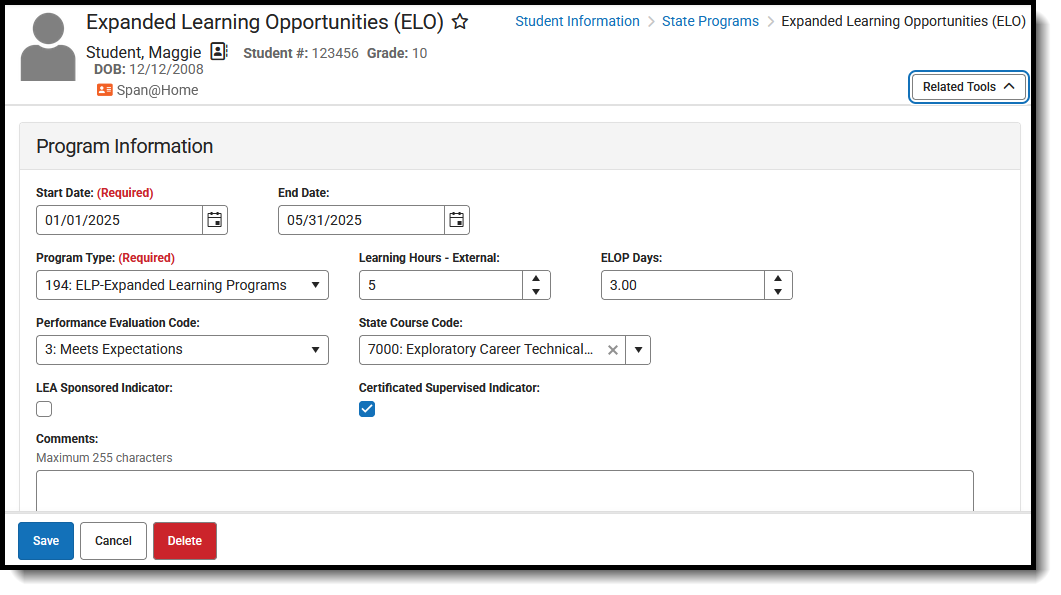 Expanded Learning Opportunities Edito
Expanded Learning Opportunities Edito
Read - Access and view the Expanded Learning Opportunities tool.
Write - Modify existing Expanded Learning Opportunities records.
Add - Enter new Expanded Learning Opportunities records.
Delete - Permanently remove Expanded Learning Opportunities records.
For more information about Tool Rights and how they function, see the Tool Rights article.
When first accessing the student's Expanded Learning Opportunities (ELO) records, select the School Year to narrow the list of records to just that year. Or, leave blank and select (view) the entire list of ELO records for the student. Documents can also be uploaded from this location.
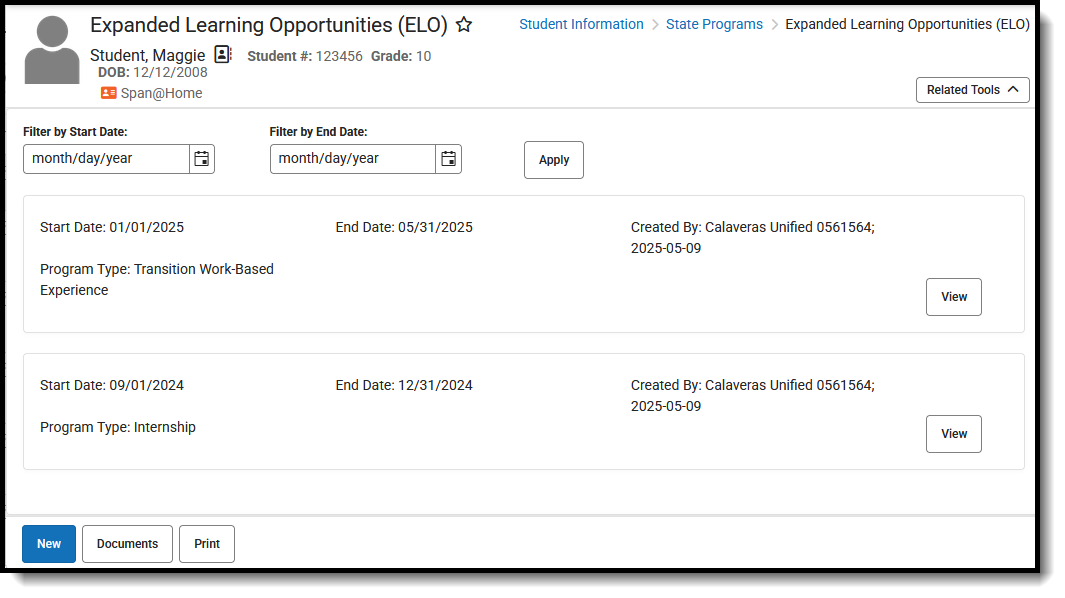 Expanded Learning Opportunities Main View
Expanded Learning Opportunities Main ViewRecords can also be printed from this main view. Click Print to generate a PDF report of the student's Expanded Learning Opportunities Records.
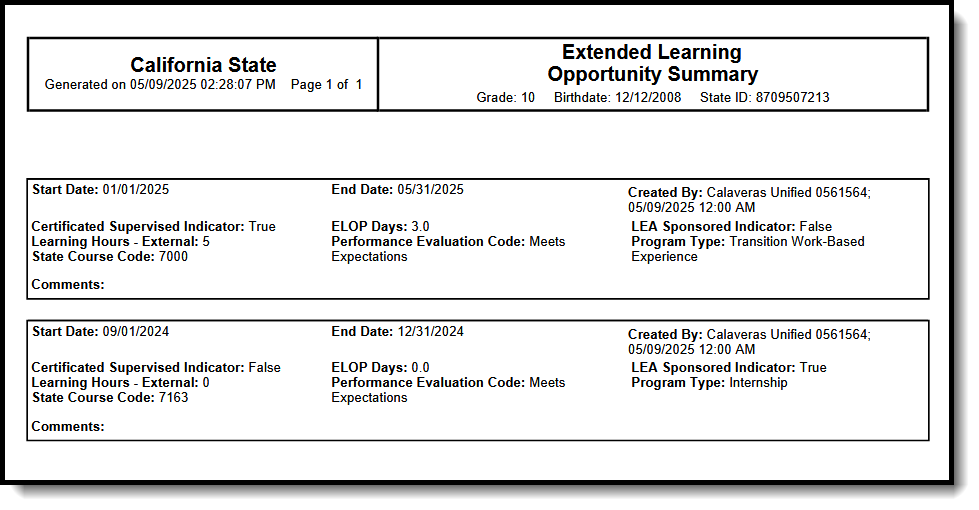 PDF Report of the Student's ELO Records
PDF Report of the Student's ELO RecordsCreate an Expanded Learning Opportunities Record
- Click New. An Expanded Learning Opportunity editor displays.
- Enter the Start Date for when the student's ELO record began.
- Select the Expanded Learning Opportunities Type from the dropdown list.
- Enter the remaining fields as needed for this student.
- Click Save when finished.
Overlapping records are allowed, meaning an End Date is not required on one record in order to add another record.
Automatic Process for Updating Attendance Hours for ELO Students
When using courses to track participation hours for ELO students, a stored procedure automatically runs on the database every morning. This procedure updates the ELOP Days. This requires Courses to be held in a non-instructional period and have the correct Type assigned.
What Updates are Made
The stored procedure sums all days (whole values only) a student attends ELO courses for all instructional days (school days) in a calendar year (up to the date the procedure runs). A student is counted when they are marked present in the course.
A student can only earn 1 day of credit per calendar day. If a student attends a before-school course and an after-school course on the same day, one 1 day is earned.
- When the student has an active ELO record (or, when there are multiple ELO records active on the current date, the most recent record), the stored procedure UPDATES the ELOP Days value.
- When the student DOES NOT have an active ELO record, the stored procedure CREATES a new record with the current start date, a Program Type of 194: ELP - Expanded Learning programs, and ELOP Days with the calculated value.
- When the student has more than one active record with a Program Type of 194, the stored procedure DOES NOT CREATE a record for them.
If the student has a Section Student Detail record with the ELO Days Earned field populated, that is the maximum number of days the student can earn through ELO courses.
What Setup is Needed
Verify the following data for System Preferences, Course (Course Master) Information, and Section Information.
| 1. |
Verify the Calculate ELOP Days Nightly System Preference is set to Yes.
|
| 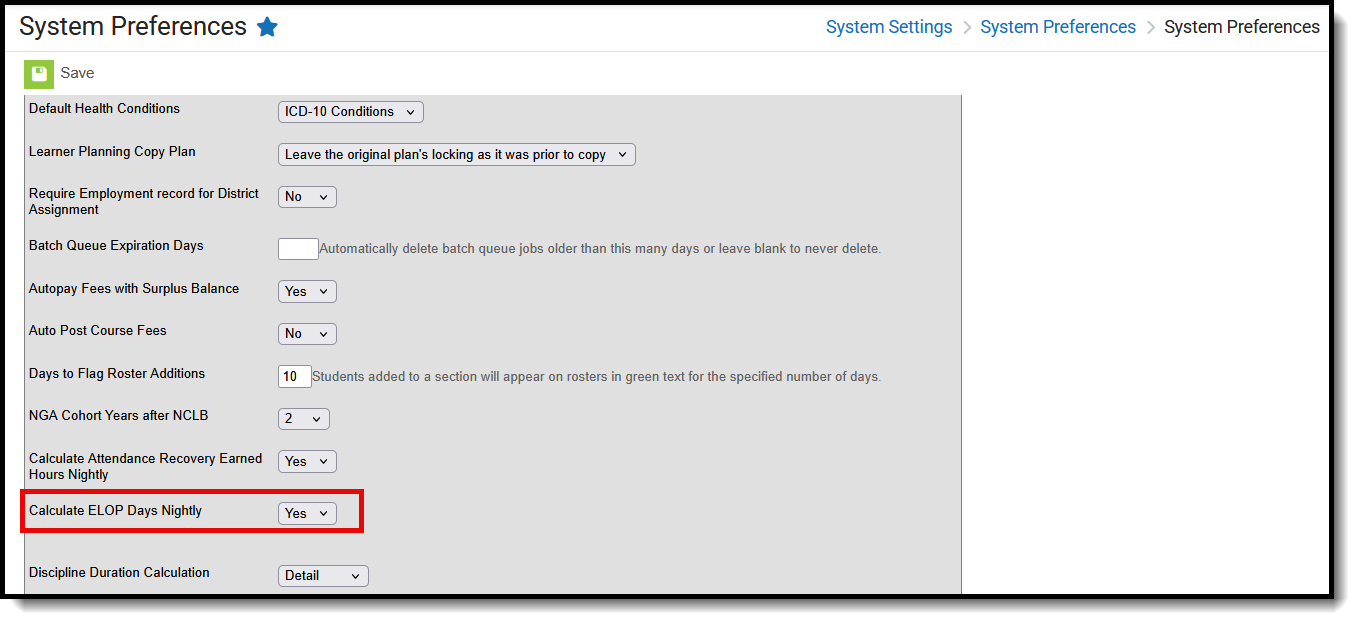 System Preferences for ELOP Calculation System Preferences for ELOP Calculation
|
|
| 2. |
In Course Information, verify that the Type field is set to one of the following:
- A1: Before School Base
- A2: After School Base
- A3: Before School Supplemental
- A4: 3-Hour After School Supplemental
- A5: 6-Hour After School Supplemental.
|
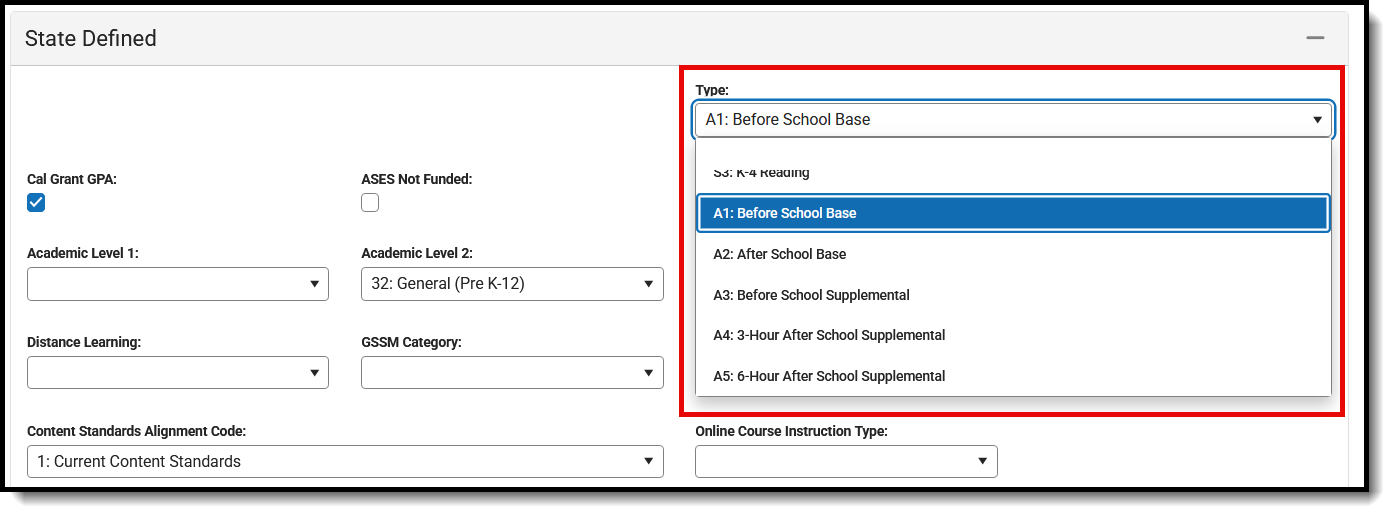 Course Type A1-A5 Course Type A1-A5 |
| 3. | In Section Information, verify that the course section is scheduled into a non-instructional period.
|
|
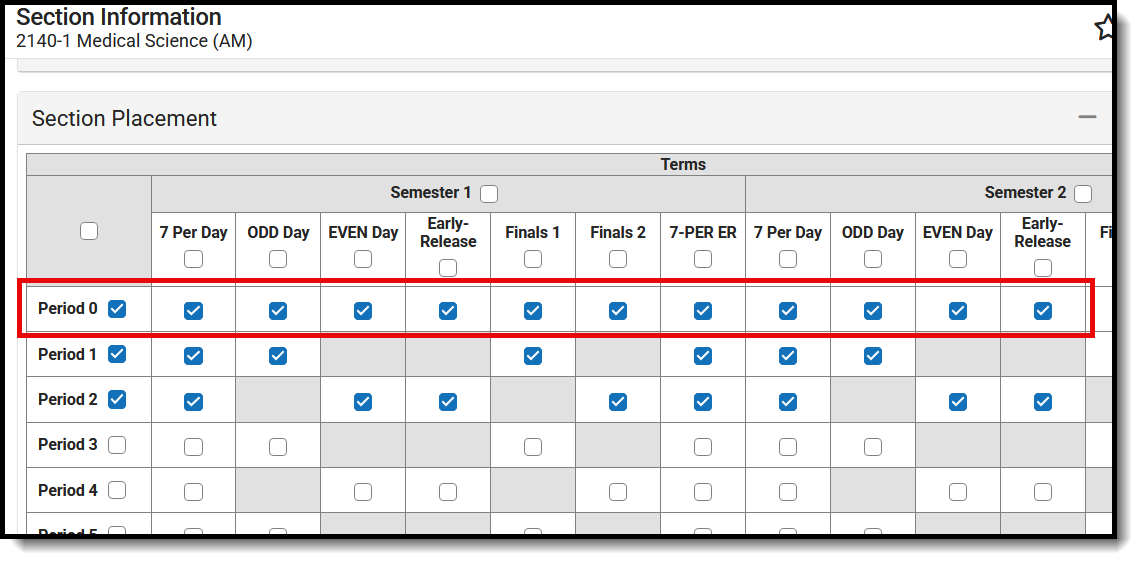 Section Placement in Non-Instructional Period Section Placement in Non-Instructional Period
| 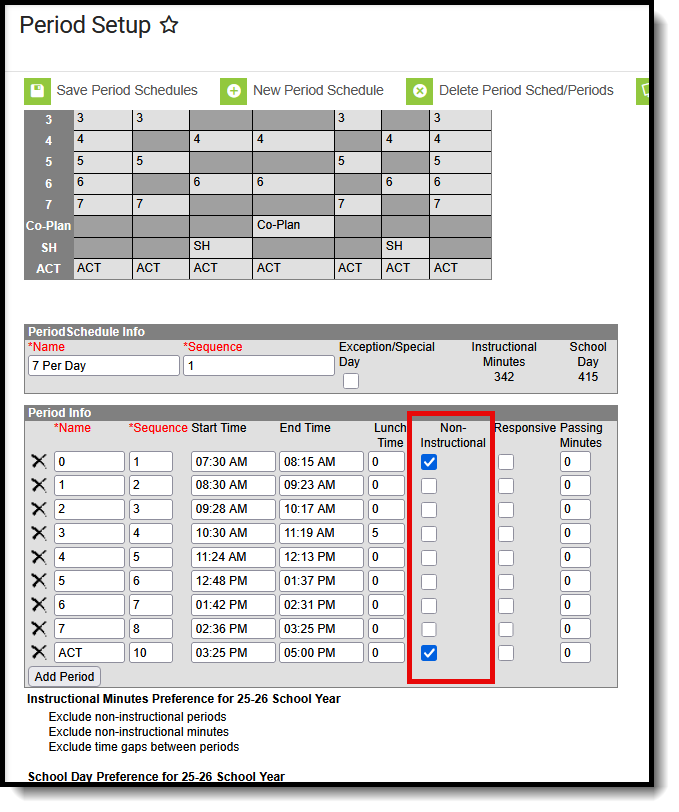 Period Setup- Non-Instructional Selection Period Setup- Non-Instructional Selection
|
Expanded Learning Opportunities Fields
| Field |
Description |
Additional Information |
|---|
| Start Date |
Indicates the date on which the ELO status began. |
Database Location:
ExtendedLearningOpportunity.startDate
Ad Hoc Inquiries:
Student > Learner > State Programs > Extended Learning Opportunity > Extended Learning Opportunity > startDate (elo.startDate)
|
| End Date |
Indicates the date on which the ELO ended.
When the End Date is left blank, state reports assume the ELO spanned the course of the current reporting enrollment (this could translate to multiple years of enrollments).
|
Database Location:
ExtendedLearningOpportunity.endDate
Ad Hoc Inquiries:
Student > Learner > State Programs > Extended Learning Opportunity > Extended Learning Opportunity > endDate (elo.endDate)
|
|
Program Type |
Lists the coded value representing the ELO learning that the student completed during the academic year, in any grades 9 - 12. This is a required field.
See the Appendix for descriptions for each type. |
Database Location:
ExtendedLearningOpportunity.learningType
Ad Hoc Inquiries:
Student > Learner > State Programs > Extended Learning Opportunity > Extended Learning Opportunity > learningType (elo.learningType)
|
| Learning Hours - External |
The count of hours that the student spent outside of school in an Expanded Learning Opportunity activity for types 10, 15, and 20 in the academic year being reported. While the hours are outside of the classroom, the Expanded Learning Opportunities activity is tied to the Internship, Student-Led Enterprise, or Virtual/Simulated Expanded Learning Opportunities. |
Database Location:
ExtendedLearningOpportunity.totalProgramHrs
Ad Hoc Inquiries:
Student > Learner > State Programs > Extended Learning Opportunity > Extended Learning Opportunity > totalProgramHrs (elo.totalProgramHrs)
|
| ELOP Days |
The number of days that the student attended the program.
|
Database Location:
ExtendedLearningOpportunity.totalProgramDays
Ad Hoc Inquiries:
Student > Learner > State Programs > Extended Learning Opportunity > Extended Learning Opportunity > totalProgramDays (elo.totalProgramDays)
|
|
Performance Evaluation Code |
A coded value representing the student’s performance in the internship as evaluated by their employment supervisor.
See the Appendix for descriptions for each type. |
Database Location:
ExtendedLearningOpportunity.performance EvaluationCode
Ad Hoc Inquiries:
Student > Learner > State Programs > Extended Learning Opportunity > Extended Learning Opportunity >performanceEvaluationCode (elo.performanceEvaluationCode)
|
| State Course Code |
The State Course Code the student completed in which the Internship, Student-Led Enterprise, or Virtual/Simulated Work-Based Learning was embedded |
Database Location:
ExtendedLearningOpportunity.stateCode
Ad Hoc Inquiries:
Student > Learner > State Programs > Extended Learning Opportunity > Extended Learning Opportunity > stateCode (elo.stateCode)
|
| LEA Sponsored Indicator |
This checkbox allows users to indicate whether the school, district, or county played a direct role in securing the internship for the student.
|
Database Location:
ExtendedLearningOpportunity.leaSponsoredInd
Ad Hoc Inquiries:
Student > Learner > State Programs > Extended Learning Opportunity > Extended Learning Opportunity > leaSponsoredInd (elo.elaSponsoredInd)
|
| Certificated Supervised Indicator |
Use the checkbox to indicate whether the internship was part of a program supervised by a certification staff member of the school, district, or county.
|
Database Location:
ExtendedLearningOpportunity. certificatedSupervisedInd
Ad Hoc Inquiries:
Student > Learner > State Programs > Extended Learning Opportunity > Extended Learning Opportunity > certificatedSupervisedInd (elo.certificatedSupervisedInd)
|
| Comments |
Lists any additional information associated with the student's ELO record. |
Database Location: ExtendedLearningOpportunity.comments
Ad Hoc Inquiries: Student > Learner > State Programs > Extended Learning Opportunity > Extended Learning Opportunity > comments (elo.comments)
|
Appendix
Expanded Learning Opportunities Type Definitions
Click this Expanded Learning Opportunities Type link to return to the field description.
| Code |
Description |
Definition |
|---|
| 10 |
Internship |
An internship is a county, district, or school-sponsored experience that exposes students to the world of work. It is performed in partnership with local business, industries, or other organizations in the community. Internships provide students opportunities for supervised and specific practice for a future career.
Internships can:
- Be paid or unpaid.
- Be Community Classroom, which is an unpaid, on-the-job training experience to help students acquire necessary competencies (skills, knowledge, and attitudes) to acquire entry-level employment. The intent of the community classroom is to provide students with additional resources so concurrent, formalized classroom instruction can be extended and the acquisition of salable skills enhanced.
- Be Co-Op Career Technical Education/Cooperative Vocational Education, which is a paid, on-the-job training experience that occurs concurrently with formal vocational classroom instruction. Cooperative vocational education assists students to develop and refine occupational competencies (attitudes, skills, and knowledge) needed to acquire, adjust, and advance in an occupation.
- Occur over the summer or during the school year.
- Occur at any business type, such as profit or non-profit.
Internships are not:
- Job shadowing (there must be supervision and specific practice and working alongside an industry expert)
- Apprenticeships
- A job that students secure on their own (e.g., summer job)
Note: Internships may, but are not required to be connected to a CTE pathway course or any course. |
| 15 |
Student-led Enterprise |
A student-led enterprise involves the development and operation of a revenue-generating business (regardless of profit or loss), that operates outside the classroom and is associated with a course at the school in which the student is enrolled and evaluated by the certificated course instructor.
The Student-Led Enterprise:
- Must be tied to a course in which students develop a business and marketing plan.
- May be tied to any course, including a course that is part of a CTE Pathway (e.g., business, marketing, entrepreneurship, STEAM, hospitality, tourism, information technology, etc.).
- Must be co-curricular (time spent in and out of the classroom)
- Must be operated by the student (student is not just an employee of the enterprise).
- Must be ongoing and not a one-day event (e.g., in agriculture course, students are in charge of caring and selling livestock, or in a culinary course, the teacher secures a job that requires food to be prepared and sold, and the student is responsible for purchasing ingredients, preparing and selling the food).
- Can include a non-profit venture.
- Must bring in revenue (but does not need to make a profit).
A student-led enterprise is not:
- A student working at the campus bookstore or volunteering at the school bake sale.
|
| 20 |
Virtual/Simulated Work-Based Learning |
A Virtual/Simulated Work-Based Learning is a program where students can gain business experience through a virtual environment that is aligned to the classroom curriculum.
The Virtual/Simulative Work-Based Learning:
- Must be tied to a course in which students develop their own business plans and websites.
- May be tied to any course, including a course that is part of a CTE Pathway (e.g., business, marketing, entrepreneurship, STEAM, hospitality, tourism, information technology, etc.).
Virtual/Simulation Work-Based Learning is not:
- An online course/program
|
| 25 |
Registered Pre-Apprenticeship Program |
A pre-apprenticeship program is designed to provide students with the entry-level skills necessary to be eligible to enter a registered apprenticeship program (i.e., an apprenticeship program that is registered at the state or national level). Typically, schools that offer pre-apprenticeship programs have a partnership with a local business.
The student:
- Successfully completed, during the academic year, a registered pre-apprenticeship program that is recognized by business and/or industry and registered at the state or national level, and
- Is awarded a certificate of completion upon successful completion of the pre-apprenticeship program.
|
| 30 |
Non-registered Pre-Apprenticeship Program |
A pre-apprenticeship program is designed to provide students with the entry-level skills necessary to be eligible to enter a registered apprenticeship program (i.e., an apprenticeship program that is registered at the state or national level). Typically, schools that offer pre-apprenticeship programs have a partnership with a local business.
The student successfully completed, during the academic year, a non-registered pre-apprenticeship program that is recognized by business and/or industry but not registered at the local, state, or national level. |
| 35 |
Job Corps |
The student successfully completed, during the academic year, a Job Corps program, administered by the U.S. Department of Education (29 USC Sections 3191-3212), which offers General Educational Development test (GED) support and vocational training to youth, ages16 to 24 years old. |
| 40 |
Workforce Innovation and Opportunity Act (WIOA) |
The student successfully completed, during the academic year, a Workforce Innovation and Opportunity Act (WIOA) Youth Program, administered by the U.S. Department of Labor (19 USC Ch. 32 (128 Stat. 1425)), which works to overcome barriers between in-school or out-of-school youth and employment by placing them in (minimum wage) jobs. |
| 45 |
YouthBuild |
The student successfully completed, during the academic year, a YouthBuild program, administered by the U.S. Department of Labor (29 USC Section 3226), which trains youth, ages 16 to 24 year old, who have dropped out of high school, in construction by building homes for low-income members of their communities. |
| 50 |
California Conservation Corps |
The student successfully completed, during the academic year, a California Conservation Corps program, administered by the California Resources Agency (CA Public Resources Code Sections14000-14424), which engages students, ages 18 to 25 years old, to perform physical labor for environmental conservation and provides life skills training. |
| 60 |
Transition Work-Based Experience |
The student successfully completed a minimum of 100 hours of work-based learning since entering 9th grade of a program for students with disabilities on an individualized education program (IEP) that offers students work-based learning experiences that develop knowledge and job skills, in compliance with the Fair Labor Standards Act (FLSA) requirements. |
| 65 |
Transition Classroom-Based Work Exploration |
The student successfully completed the equivalent of four semesters of college and career exploration/preparation courses designed to prepare a student with an IEP for employment and independent living since entering 9th grade. |
| 194 |
ELP-Expanded Learning Programs |
Expanded learning programs would include the Expanded Learning Opportunities Program (ELOP), the After School Education and Safety (ASES) and the 21st Century Community Learning Centers programs. An “enrolled student” means any student whose parents or guardians have signed an expanded learning program registration form. If that form is on file, that student shall be considered enrolled in the expanded learning program. This education program code is treated "participating" not just "eligible". |
Performance Evaluation Code Definitions
Click this Performance Evaluation Code link to return to the field description.
| Code |
Description |
Definition |
|---|
| 1 |
Does Not Meet Expectations |
Employer evaluated student's overall internship performance as not meeting expectations. The evaluation should include the following three categories:
- Foundational Skills
- Applied Workplace Skills
- Self-Management
The student received a rating of "Does Not Meet Expections" in two or more categories.
|
| 2 |
Partially Expectations |
Employer evaluated student's overall internship performance as partially meeting expectations. The evaluation should include the following three categories:
- Foundational Skills
- Applied Workplace Skills
- Self-Management and Personal Responsibility
The student received a rating of "Partially Meets Expectations" in two of the three categories.
|
| 3 |
Meets Expectations |
Employer evaluated student's overall internship performance as meeting expectations. The evaluation should include the following three categories:
- Foundational Skills
- Applied Workplace Skills
- Self-Management and Personal Responsibility
Minimally, the student must earn a rating of "Meets Expectations" in all three categories.
|
| 4 |
Above Expectations |
Employer evaluated student's overall internship performance as being above expectations. The evaluation should include the following three categories:
- Foundational Skills
- Applied Workplace Skills
- Self-Management and Personal Responsibility
Minimally, the student must earn a rating of "Above Expectations" in at least two of the three categories, and no rating was "Partially Meets Expectations" or less.
|
 Expanded Learning Opportunities Edito
Expanded Learning Opportunities Edito
 Expanded Learning Opportunities Main View
Expanded Learning Opportunities Main View PDF Report of the Student's ELO Records
PDF Report of the Student's ELO Records System Preferences for ELOP Calculation
System Preferences for ELOP Calculation Course Type A1-A5
Course Type A1-A5 Section Placement in Non-Instructional Period
Section Placement in Non-Instructional Period
 Period Setup- Non-Instructional Selection
Period Setup- Non-Instructional Selection